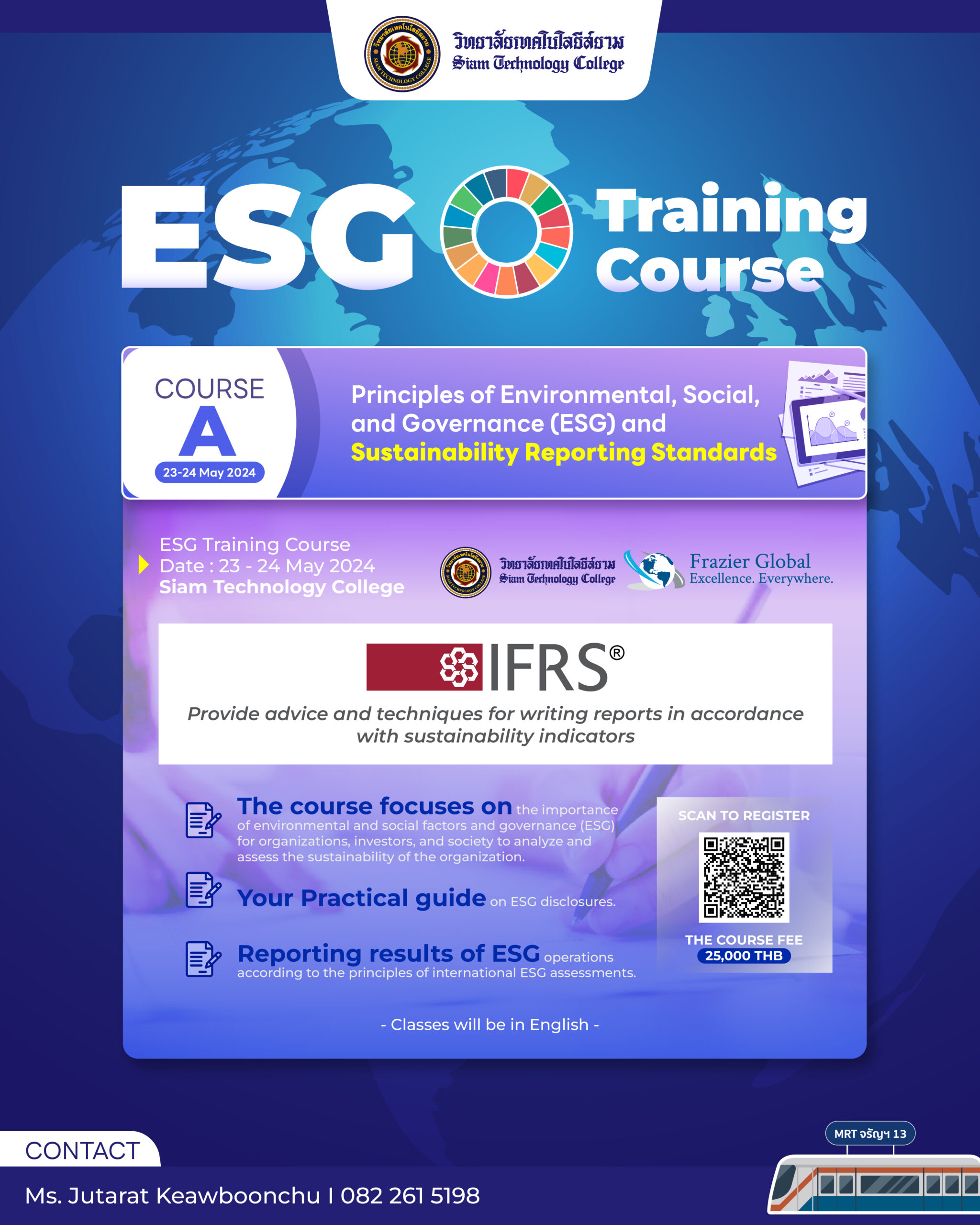Principles of Environmental, Social, and Governance (ESG) and Sustainability Reporting Standards
Price - baht.
–
Time
–
Course Key Concepts :
This intensive course is offered as an 8 week course or a two-day short course that focuses on the critical importance of Environmental, Social, and Governance (ESG) factors in creating value for corporates, investors, and society. Students and professionals will delve into the necessary steps to support the collection, analysis, measurement, and disclosure of ESG performance. Students will also develop a comprehensive understanding of ESG and Sustainability topics. Students will learn how to apply material ESG issues effectively to inform financial decision-making and learn how to develop a robust reporting and disclosure framework. A key aspect of the course is evaluating business cases on how ESG data and technologies are employed in collecting, measuring, and reporting information.
The course also explores the critical concepts underlying ESG disclosure and its essential role in business operations. It examines the characteristics of high-quality disclosures, providing examples of investor-facing and public-facing reporting frameworks including ISSB, SASB and GRI. Additionally, students will gain insight into emerging trends in ESG regulations and reporting. The course will highlight how to interpret ESG disclosure and analyze its quality. Students will learn how stakeholders evaluate ESG risks and opportunities. They will also have the opportunity to compare and contrast the ESG disclosures of several companies using real, publicly available information.
Overall, this course prepares professionals, students, supplier representatives, and business leaders with a fundamental understanding of ESG principles and their significance in corporate and investor decision-making and sustainability reporting.
Course Duration :
Intensive two-day short course or an 8 week course
Target Audience :
Undergraduate and Graduate students and Corporate Professionals
Learning Objectives
Tentative Time Table for the Course
Sec. | Time | Topic | Materials & Activities | Evaluation | Lecturer (s) |
Module 1 : Introduction to ESG & Sustainability – What is ESG?
– Sustainable Development Goals (SDGs) – Key Reporting Standards and Frameworks – Responsible investment versus Corporate Management – Benefits of Sustainability Programs with ESG – Class Quiz & Discussion |
| ||||
Module 2 : Exploring the ESG Pillars – Diving deeper into ESG Risk and Opportunity Issues
– Class Quiz & Discussion | |||||
Module 3 : Carbon Offsets (insetting) – An introduction to climate change
| |||||
Module 4 : Carbon removal (nature-based solutions and technical) – Understanding materiality in ESG – Double Materiality – GRI vs ISSB
– Case Study on Defining Material Issue – Environmental, Social, Governance – SASB Sectors & Industries ESG Standards & Factors – Case Study on ESG integration – Class Quiz and Discussion | |||||
Module 5 : Tech, Data, and ESG – Role of Tech and Data – Why Important to invest in ESG data & technologies – ESG Reporting Frameworks – Practice Steps for ESG Data Integration | |||||
Module 6 : Sustainability Accounting Standards and Guidance – Consolidation of Alphabet Soup of Accounting Standards and Frameworks – Types of ESG Information – The need for sustainability accounting standards – Evaluating the Comparability of Sustainability Information – The Connection Between Sustainability Performance and Valuation – Class Quiz and Discussion – Sustainability and ESG Report Homework | |||||
Module 7 : Carbon Accounting Standards – ISSB’s New Standards: S1 & S2 – IFRS Governance and Oversight Structure – Market Drivers for the ISSB – ISSB Objectives – IFRS Standards within the Broader Reporting Landscape – Architecture of the New Standards
– Class Quiz & Discussion | |||||
Module 8 : Stock Exchange of Thailand (SET) Guidance – Sustainability Disclosure Guidelines in the Thai Capital Market – Benefits of Sustainability Reporting – In Depth look into the Guide – ESG Metrics | |||||
Module 9 : ESG Reporting and Disclosure – Writing & Interpreting – ESG Report Case Examples – ESG Disclosures – Preparing for Disclosures – Form 56-1 One Report – ESG Ratings and Broader Ecosystem – Evaluation, Best Practices and Report Examples – Integrated Reporting – Greenwashing and Why it is Important to Avoid – Sustainability and ESG Reporting Assurance – Designing the Sustainability or ESG Report – Class Quiz and Discussion | |||||
Module 10 : Sustainability Report Review & Group Briefings – Sustainability Report Review and Discussion | |||||
Module 11 : Integrating ESG into Corporate Performance: A Practical Approach – Key Business Challenges linked to ESG performance target, reporting and disclosures – An Example Approach to Develop & Integrate an ESG Strategy | |||||
Module 12 : Key ESG Regulation and Policy Developments – Key ESG Regulation and Policy Developments
|

Siam Technology College
วิทยาลัยเทคโนโลยีสยาม
Contact Us
- 46 Charansanitwong Road Wat Tha Phra Subdistrict, Bangkok Yai, Bangkok 10600
- 02-878-5000
- info@siamtechno.ac.th
- www.siamtechno.ac.th


